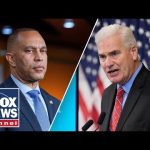The recent government shutdown has inflicted a significant economic toll on the nation, with the Congressional Budget Office estimating losses up to $14 billion. This costly halt, largely driven by Democratic opposition to President Trump’s agenda, disrupted what was otherwise a promising economic trajectory marked by a solid 3.8% growth rate. While the shutdown was portrayed by some as being about healthcare, it was clearly a political stunt with severe consequences, putting the American economy and taxpayers in a bind as government operations played catch-up amid halted spending and delayed federal payments.
Treasury Secretary Scott Bessent faces the tough job of managing the fallout, emphasizing that while the shutdown’s impact is a setback, it is only a temporary “bump in the road.” However, the financial realities are harsh: millions of federal workers missed paychecks totaling about $16 billion in wages, translating to less spending in local economies, postponed purchases, and reduced travel. These disruptions ripple through the economy, especially during critical periods such as the holiday season, underscoring how political brinkmanship harms everyday Americans.
On the brighter side, the administration is pushing forward with measures aimed at economic recovery and sustained growth. Plans to reduce tariffs on staples like coffee from Vietnam and Brazil aim to ease inflationary pressures at grocery stores, making life more affordable for families. Additionally, new investments in American manufacturing, such as a Boeing plant in Charleston and a rare earth facility in Sumpter, are poised to create thousands of jobs. These moves signal a return to pro-growth policies and a focus on rebuilding the domestic labor market with high-paying roles.
Bessent also highlighted innovative fiscal strategies, including discussions about potential stimulus checks for lower and middle-income families and new financial tools like “Trump accounts” designed to invest in children’s futures via the stock market. These proposals demonstrate an economic vision centered on tangible support for American families and long-term prosperity, rather than short-term political maneuvering.
In the immigration and workforce debate, tensions surfaced over visa policies for foreign workers. The administration insists that skilled immigration complements rather than replaces American labor, addressing shortages while boosting industries. This balanced approach underlines the administration’s goal of maximizing economic potential while protecting domestic workers. Despite the economic headaches caused by the shutdown, there remains cautious optimism for a rebound, backed by strategic investments and policies grounded in American workers’ interests. The real lesson here is that political games that derail the economy ultimately hurt the very people Democrats claim to champion.




